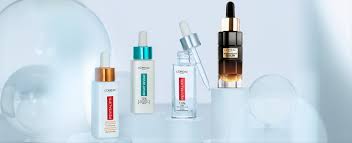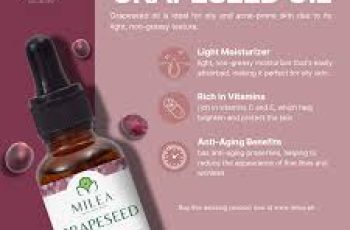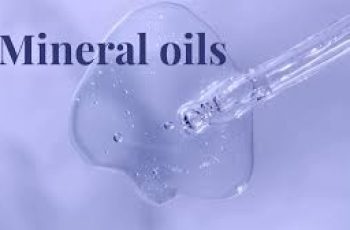Why should you consider using a serum?
It’s easy to think that serums are one of the most mysterious skincare products. You may have collected different types yourself (we certainly have), but can you honestly admit that you really know what exactly they do for your skin?
We’ve put together a serum overview for you to check out and get a better understanding of this amazing product. What is a serum? A serum is a blend of multiple powerful ingredients that are used to treat a variety of skin conditions.
You’ll find that they can vary in consistency, but they are generally water-based and absorb into the skin in record time! Their formula is made up of smaller molecules that allow them to penetrate into the lower layers of the skin.
Because they penetrate deep into the skin, they’re great for targeting areas like wrinkles and fine lines.
What are the benefits of serums?
Honestly, the benefits of serums for the skin are overwhelming. Packed with a variety of ingredients (hyaluronic acid, ceramides, and vitamin C, to name a few), the possibilities are endless.
The purpose of a serum is to contain a ton of active ingredients to penetrate deep into the skin and combat any skin concerns. Here are some of the key benefits of a serum: Serums increase collagen production and help
fight signs of aging like fine lines and wrinkles.
Serums retain moisture in the skin and prevent dryness. The serum reduces the appearance of dark spots and uneven skin tone. Serums protect the skin from harmful free radicals and environmental effects like pollution. Serums treat
lighten acne-prone skin and prevent further acne and breakouts from forming.
This all sounds pretty impressive, right?
You might be wondering, why would you ever use a moisturizer when a serum is so exhausting? Although serums are great for hydrating and replenishing the skin, it is still recommended to use a moisturizer because it works on the outer layer of the skin,
forming a protective barrier on the face that retains all the good stuff and keeps the skin hydrated. Protect makes serums and moisturizers a powerful combination in your skincare routine to fight off the bad stuff.
Why should I use a serum?
Ultimately, it all comes down to you and the products you use on your skin, after all, it is your skin. However, if you find that despite daily cleansing, toning and moisturizing, your skin is looking increasingly dull, lackluster and showing signs of aging, then deciding to add a serum to your routine could be the solution.
Serums are more concentrated and faster-acting than moisturizers because once the serum penetrates the skin, it works carefully with little interruption, while the facial epidermis is protected by the moisturizer. It’s a win-win situation!
How to use a serum?
To ensure that your serum works best, you need to use it at the right time in your daily routine. Here are the key steps you need to follow to get the best results from your serum. Make sure you have removed any makeup residue using a makeup remover (preferably not wipes). Cleanse your skin thoroughly to remove all remaining traces of makeup, dirt, debris, oil, and daily buildup of grime and pollutants.
Next, apply a facial toner. This will remove the layer of dead skin cells that form a barrier, making it difficult for the serum to absorb into the skin. Now apply the serum to your face (being careful not to get it in your eyes) and leave it on for a few minutes to allow it to fully absorb into the skin.
Use your favorite moisturizer to create a protective barrier and balance the water and oil levels of your skin. Lastly, apply a sunscreen of SPF 30 or higher to protect your skin from UV rays. This is a great example of a basic
daily skincare routine you can try when you feel like your skin is missing something and needs a little boost.
Serums are considered more expensive skincare products, but they are definitely an investment worth spending your hard-earned money on. The potent formula of this serum is so strong and effective that it will do wonders for your complexion if used correctly.
When should I start using a serum?
Yesterday! But let’s face it, there is no wrong time to start using a serum in your daily routine. Prevention is the secret to keeping your skin healthy, happy, and youthful. The sooner you start, the better!
Should you use a serum every day?
Whether it’s yes or no, it’s still best to check the label and double check. It all depends on the ingredients used and the idea behind the formula. For example, a night serum may contain retinol, which is sensitive to UV rays and doesn’t work as well when used during the day. However, generally speaking, most serums can be used every day.
Is using a serum right for my skin type? Almost everyone will benefit from using a serum. Here are the key ingredients to look for when searching for the best serum for you and your skin type. Oily skin is acne prone –
For those with sensitive skin, be careful. Due to the power of a serum, the active ingredients can be a bit strong and may cause irritation. It is best to do a 24-hour patch test before applying a serum to your skin.
For dull skin, an antioxidant-rich serum can help protect the skin from free radical damage and rejuvenate it. If you have any questions or concerns about using a serum, contact your dermatologist for further advice.
Serums are amazing skin-transforming products and hopefully you now have a better understanding of what a serum can actually do for your skin. With a ton of products on the market, many of which have achieved great results,
You really have a lot to choose from!
DQH Knowledge drop: In your 20s, your skin cell turnover decreases. (Cell turnover is a key component in keeping your skin youthful.) You know what else slows down? Your collagen production. Starting in your 20s, collagen decreases by about 1 percent per year. Should you want to prevent fine lines and wrinkles, start by eliminating behaviors that contribute to premature aging. “If it’s bad for you, it’s bad for your skin,” says dermatologist Michel Somenek.
“Cigarette smoking reduces blood flow to the skin and causes premature wrinkling and a dull skin texture. Making the repeated pursed motion to inhale can also cause smoker’s lines. Alcohol and recreational drugs are toxins for the skin that damage its cellular structure and DNA,” Somenek tells us. “The faster you eliminate vices while you are young, the better chance your skin and body have to recuperate.” Also, adopting an anti-aging routine in your 20s is key. After all, the best offense is a good defense. We spoke to Somenek and experts Joshua Ross and Audrey Kunin to find out more.
Keep reading for the best anti-aging products for your 20s, according to skincare professionals.
Sunscreen
“We all know that the sun is the number one cause of skin aging and starting the prevention in your 20s is very important,” Ross says. “The majority of your sun damage won’t start to appear until you’re in your 30s, so don’t wait until you see it surface or you’ll be behind the curve. Stay ahead of it with a good-quality zinc-based sunscreen worn daily.”
Farmacy Green Defense Daily Mineral Sunscreen
An invisible sunscreen with SPF 30, plus botanical extracts meant to protect skin with tons of antioxidants. Bonus: It’s clean and fine to use under makeup.
Bareminerals Complexion Rescue™ Tinted Moisturizer Broad Spectrum SPF 30
Although we recommend you use your SPF and moisturizer separately, we also understand moments when you don’t have time or energy for that extra step. For those times, this bareMinerals moisturizer is a great thing to have on hand.
Vitamin C Serum
“A great introduction to anti-aging is to start with a vitamin C serum in your morning skincare routine,” Ross says. “It’s a powerful antioxidant that will neutralize free radicals and brighten the skin.” He adds that it’s a great way to counteract the effects of the sun’s harmful rays, which, as previously mentioned, are among the biggest causes of premature aging.
Drunk Elephant C-Firma™ Vitamin C Day Serum
The Drunk Elephant C-Firma is a lightweight serum that promises to give skin a glow by combining the brightening powers of vitamin C with ferulic acid, l-ascorbic acid, and vitamin E. The included sodium hyaluronate is meant to replace hydration loss, so you shouldn’t have to deal with any irritation.
Sunday Riley C.E.O. Rapid Flash Brightening Serum
This potent serum is jam-packed with vitamin C (15 percent, to be exact), which means it’s a potential superstar at both brightening skin and dousing it in antioxidants.
Peptides
Using peptides on your skin has many benefits, says Somenek. “The skin barrier is what defends the body against pollution, UV rays, bacteria, and toxins. It can be damaged by several everyday factors. Using topical peptides aids in building a stronger barrier,” he says. “Peptides comprise elastic fibers, which are a type of protein. These fibers help to make skin appear taut and firm. Peptides can also help repair damaged skin, relieve inflammation, and even out skin tone. Some peptides can kill acne-causing bacteria that is common in 20-somethings.”
Kunin agrees, saying, “Peptides are an excellent entry point for supporting collagen.” She recommends looking for face and eye treatments that contain these collagen-boosting powerhouses.
Charlotte Tilbury Magic Eye Rescue Cream
This Charlotte Tilbury super-emollient eye cream has a base of coconut oil and shea butter (read: it’s incredibly hydrating). Botanicals plus peptides are meant to help reduce dark circles and boost collagen, respectively.
This creamy moisturizer serves up potent collagen-boosting peptides and pycnogenol, and antioxidant-rich vitamin C. “Instead of sitting on top of the skin, peptides penetrate the outer layer so they go deep. The ‘signals’ they send tell the cells to produce elastin and collagen, which are needed for youthful-looking skin,” explains Somenek.
At-Home Peel Pads
Remember that skin cell turnover fiasco we talked about earlier? One way to help support it is by exfoliating. “Exfoliation is important to help keep skin fresh and luminous,” Kunin says. She recommends using at-home peel pads as an easy and effective way to exfoliate.
“The goal in your 20s is to fight the slowing pace of cell turnover. It is wise to use products that gently exfoliate, yet still remove oil and other impurities. Products that have Alpha Hydroxy Acids (AHA) or Beta Hydroxy Acids (BHA) are a good choice.”
According to Somenek, you should only exfoliate two to three times a week. “People of all ages are guilty of over-exfoliating and that can be too much of a good thing,” he says.
Dermadoctor Kakadu C Intensive Vitamin C Peel Pad
A few swipes of this Derma Doctor powerful peel pad promise to leave your skin glowing and smooth, thanks to the seven (yes, seven) types of chemical exfoliants, including AHA and BHA. It also contains vitamin C via Kakadu plum extract for added brightening and antioxidant protection.
KEY INGREDIENTS Kakadu plum extract is sourced from the Kakadu plum, a fruit grown in northern Australia. It contains vitamin C, which restores the skin’s natural barrier, increases collagen production, and soothes irritation.
Dr. Dennis Gross Skincare Alpha Beta® Universal Daily Peel Pads
These are the gold standard of peel pads, with a cult following and over 900 five-star reviews on Sephora. They’re easy to use and contain a blend of anti-aging exfoliating acids.
Emollient Night Cream
“In your 20s, you need to start upping the hydration in your skincare routine. You may have been cautious of over-moisturizing because of acne in your teens, but as you enter your 20s, your skin transitions and becomes drier,” Ross says. “I recommend an emollient night cream added into your evening skincare regimen.”
“Twenty-somethings need to make sure that they are not using creams that will clog their pores and cause excess oil production,” says Somenek. Opt for non-comedogenic products.
Cerave Skin Renewing Night Cream
One great choice is the CeraVe Skin Renewing Night Cream, which is a non-comedogenic night cream that leaves skin soft and glowy. It combines the moisturizing powers of ceramides and hyaluronic acid.
RoC Retinol Correxion Max Hydration Creme
“The best night cream ingredients contain retinol, benzoyl peroxide, and/or salicylic acid or hyaluronic acid. The goal is to moisturize, yet remove excess oil,” says Somenek. This Roc Retinol Correxion cream fits the bill as it contains both hyaluronic acid and retinol so it promises to moisturize while also being non-comedogenic.



